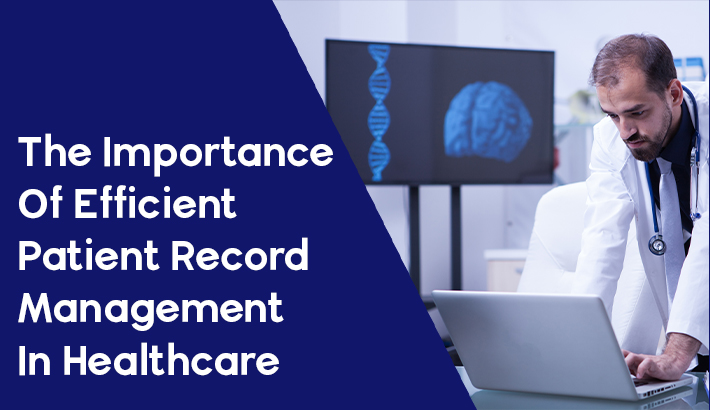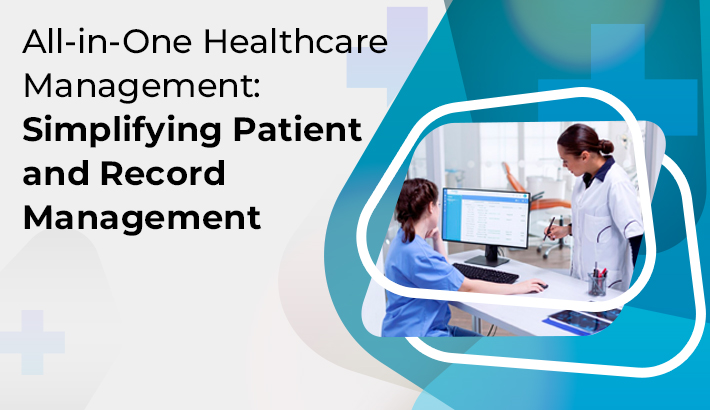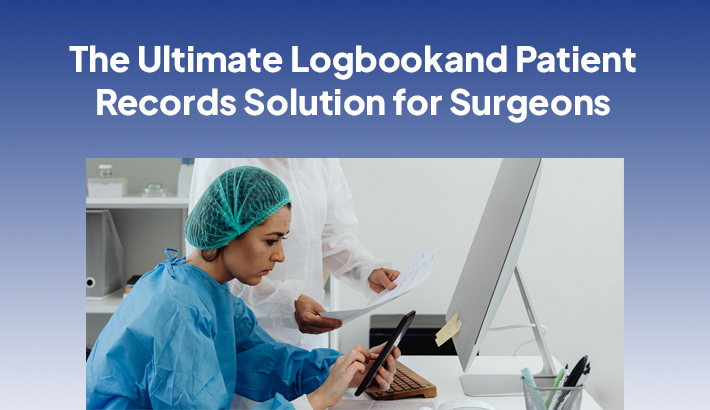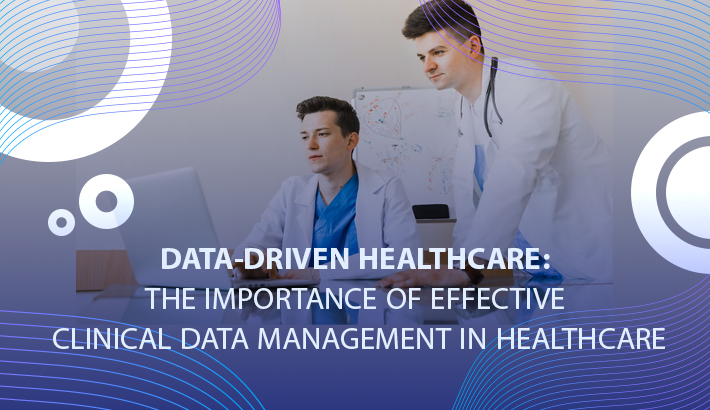Step into the dynamic world of healthcare where efficient patient record management takes center stage. As technology evolves and the need for top-notch healthcare rises, the importance of handling and leveraging patient records with precision becomes absolutely crucial. Join us on this journey of optimizing healthcare for a brighter, data-driven future.
Introduction
In today's healthcare industry, patient record management plays a crucial role in providing efficient and effective healthcare services. Gone are the days of relying on stacks of paper-based records; instead, healthcare providers are embracing digital solutions like Electronic Health Records (EHRs) and cutting-edge technologies. This blog will explore the importance of patient record management in facilitating informed decision-making, improving patient care, and revolutionizing the way healthcare professionals manage and access crucial patient information. Stay tuned to discover how these advancements are transforming the healthcare landscape.
Significance of Efficient Patient Record Management
Efficient patient record management stands as the linchpin in advancing the quality of healthcare services. With a streamlined approach to collecting and organizing patient data, healthcare professionals gain a comprehensive view that transcends traditional limitations. This not only leads to improved patient care and outcomes but fosters seamless communication among healthcare providers, ensuring a collaborative and error-reduced environment. Furthermore, in an era marked by stringent regulatory requirements, efficient record management becomes the backbone of compliance, protecting patient privacy and minimizing legal risks.
In addition to elevating patient care, the significance of efficient patient record management is underscored by its ability to address contemporary challenges in the healthcare landscape. From navigating data security and privacy concerns to integrating diverse healthcare systems, a well-managed record system becomes a powerful solution. By embracing technologies like Electronic Health Records (EHRs), Artificial Intelligence (AI), and blockchain, healthcare providers can not only overcome these challenges but also pave the way for a more interconnected and resilient healthcare ecosystem.
Looking ahead, the importance of user-friendly interfaces cannot be overstated. Beyond serving healthcare professionals with accessibility, these interfaces empower patients with easy access to their health information, fostering a collaborative approach to healthcare. As we delve into the complexities of modern healthcare, the role of efficient patient record management emerges as a cornerstone, ensuring a future where data-driven decisions, patient engagement, and regulatory adherence converge for the betterment of healthcare as a whole.
Challenges in Patient Record Management
Efficient patient record management, while transformative, is not without its challenges. The first hurdle is the pressing concern of data security and privacy. As patient records transition to digital formats, safeguarding sensitive information becomes paramount. Healthcare providers must implement robust security measures to fend off potential cyber threats and unauthorized access, ensuring the confidentiality and integrity of patient data.
Another challenge lies in the integration of diverse healthcare systems. Organizations often use a variety of systems for different purposes, and harmonizing these systems for seamless data flow is no small feat. Interoperability becomes crucial in unlocking the full potential of patient records, enabling comprehensive healthcare insights and streamlined communication among different facets of the healthcare system.
Moreover, the human factor cannot be overlooked. Staff training and the adoption of new technologies present significant challenges. The transition from traditional to digital record management requires a cultural shift and ongoing training programs to equip healthcare professionals with the skills needed to navigate and leverage these advanced systems effectively. Addressing these challenges head-on is vital for realizing the full benefits of efficient patient record management.
Solutions and Technologies
In the healthcare industry, embracing innovative solutions and technologies is paramount for efficient patient record management. Electronic Health Records (EHRs) stand as a cornerstone, offering a comprehensive digital overview of a patient's medical history. These systems not only streamline workflows but also enhance accessibility, marking a significant departure from traditional paperwork. Another frontier is the integration of Artificial Intelligence (AI), where machine learning algorithms analyze vast datasets, aiding in pattern recognition and elevating diagnostic accuracy. Additionally, Blockchain technology emerges as a game-changer, ensuring the security and integrity of patient records through decentralized, tamper-resistant storage.
Real-world case studies illuminate the success of these solutions in healthcare organizations. Implementing robust record management systems has yielded positive impacts on patient experiences and healthcare workflows. The seamless exchange of information among healthcare professionals has translated into improved efficiency and reduced administrative burdens. These success stories underscore the transformative potential of embracing technology in patient record management.
Looking ahead, the future holds promising advancements. Interoperability and data sharing are on the horizon, promising seamless connectivity between different healthcare systems. The shift towards patient-centric approaches emphasizes empowering individuals with control over their health data. As technology continues to evolve, the integration of these solutions not only enhances the quality and accessibility of patient records but also sets the stage for a more interconnected and patient-focused healthcare landscape.
Importance of User-Friendly Interfaces
Navigating the complexities of patient record management is made significantly smoother with the implementation of user-friendly interfaces. These interfaces, designed with accessibility in mind, not only benefit healthcare professionals but also empower patients. For healthcare providers, intuitive designs and straightforward navigation contribute to efficient use, reducing the learning curve and enhancing overall workflow. Simultaneously, patients find themselves actively engaged in their healthcare journey, accessing vital information with ease and fostering a collaborative relationship with their healthcare providers.
User-friendly interfaces address a fundamental aspect of accessibility for healthcare professionals. With intuitive designs and easy navigation, these interfaces facilitate efficient use of patient record management systems. This not only streamlines daily workflows for healthcare providers but also minimizes the risk of errors associated with complex or cumbersome interfaces. As technology continues to play a pivotal role in healthcare, prioritizing user-friendly designs ensures that the benefits of digital record management are fully realized without causing unnecessary strain on the professionals utilizing these systems.
The impact of user-friendly interfaces extends beyond the realm of healthcare providers to the very heart of patient care – the patients themselves. Accessible interfaces empower individuals to actively participate in managing their health records. This engagement not only fosters a sense of ownership over one's health but also contributes to a transparent and collaborative relationship between patients and healthcare providers. In the pursuit of efficient patient record management, the importance of user-friendly interfaces cannot be overstated, as they bridge the gap between technology and the human experience in the healthcare landscape.
The Role of Healthcare Providers
The role of providers in efficient patient record management cannot be overstated. These professionals bear the crucial responsibility of maintaining accurate and up-to-date patient records, ensuring a comprehensive view of an individual's medical history. By embracing this responsibility, healthcare providers contribute significantly to informed decision-making, ultimately leading to improved patient care and outcomes.
Collaboration among healthcare providers is key in the realm of data exchange. Shared patient records facilitate a holistic approach to healthcare, allowing different specialists and practitioners to contribute their expertise. This collaborative effort ensures that each healthcare professional involved in a patient's care journey has access to the necessary information, leading to more coordinated and effective treatments.
Cost-Benefit Analysis: Understanding the Financial Impact of Patient Record Management
Navigating the landscape of efficient patient record management involves a critical aspect—cost-benefit analysis. While the initial implementation may pose financial considerations, the long-term advantages far outweigh the costs. Streamlining workflows and reducing operational expenses become tangible benefits, optimizing resource allocation and overall efficiency.
One significant advantage is the reduction in operational costs. With streamlined processes, decreased paperwork, and improved efficiency, healthcare organizations experience a positive impact on their financial bottom line. The shift towards digital record management systems not only saves time but also ensures that resources are allocated judiciously, contributing to sustained cost-effectiveness.
Moreover, the improved resource allocation extends beyond financial aspects. Efficient patient record management provides data-driven insights that guide healthcare providers in allocating their resources effectively. This optimization enhances the overall quality of care, ensuring that resources are directed where they are most needed, ultimately benefitting both healthcare professionals and patients alike.
In essence, the cost-benefit analysis of efficient patient record management underscores not just financial gains but a holistic enhancement of healthcare processes, aligning with the overarching goal of providing high-quality and patient-centric care.
Ensuring Data Accuracy and Integrity
Importance of Regular Audits: Regular audits of patient records are essential to ensure data accuracy and integrity. These audits identify and rectify errors, providing a reliable foundation for healthcare decisions.
Strategies to Prevent Errors and Discrepancies: Implementing strategies such as staff training programs and automated error-checking systems helps prevent errors and discrepancies in patient records. Proactive measures contribute to the overall reliability of the data.
Legal Implications
Patient Rights and Data Ownership: Patients have rights over their health data. Healthcare providers must respect these rights, including providing access to records and ensuring the confidentiality of sensitive information.
Compliance with Healthcare Regulations: Adherence to healthcare regulations is non-negotiable. Failure to comply not only jeopardizes patient trust but also exposes healthcare providers to legal consequences. A comprehensive understanding of regulations is essential for all involved parties.
Conclusion
In conclusion, the significance of efficient patient record management in healthcare is paramount. Serving as a cornerstone for quality care, it not only ensures compliance with regulations but also marks a crucial stride into the digital era of healthcare. As we gaze into the future, the landscape of patient record management is set to evolve, driven by advancements in technology, a push for interoperability, and an unwavering commitment to patient-centric approaches. The seamless integration of these elements will undoubtedly redefine how healthcare data is managed and utilized for the benefit of both professionals and patients alike.
FAQs
Q1. How does efficient patient record management contribute to improved patient outcomes?
Efficient patient record management provides healthcare professionals with timely and comprehensive information, leading to better-informed decisions and improved treatment plans.
Q2. What role does AI play in patient record management?
AI assists in analyzing vast amounts of data, identifying patterns, and improving diagnostic accuracy, contributing to the efficiency of patient record management.
Q3. Why is data security a concern in digital patient record management?
Digital patient record management introduces the risk of unauthorized access and cyber threats, emphasizing the need for robust data security measures.
Q4. How can healthcare providers ensure data accuracy in patient records?
Regular audits, staff training programs, and automated error-checking systems are key strategies to ensure data accuracy in patient records.
Q5. What steps can be taken to overcome resistance to change in implementing new record management systems?
Addressing concerns, effective communication, phased implementation, and ongoing support for staff are crucial in overcoming resistance to change in record management systems.




